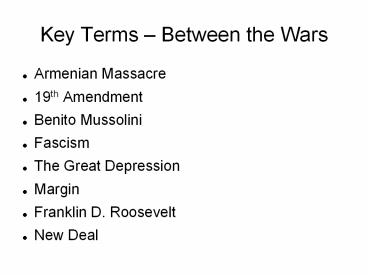Key Terms - PowerPoint PPT Presentation
1 / 13
Title:
Key Terms
Description:
Key Terms Between the Wars Armenian Massacre 19th Amendment Benito Mussolini Fascism The Great Depression Margin Franklin D. Roosevelt New Deal Failure of the ... – PowerPoint PPT presentation
Number of Views:123
Avg rating:3.0/5.0
Title: Key Terms
1
Key Terms Between the Wars
- Armenian Massacre
- 19th Amendment
- Benito Mussolini
- Fascism
- The Great Depression
- Margin
- Franklin D. Roosevelt
- New Deal
2
Failure of the League of Nations
- The creation of the League of Nations was
intended to become a forum for major nations to
settle disputes through a neutral third party. - Consequences for continued aggression or
ignorance of a law would lead to trade blockades
to force actions. - Considering many countries did not enforce these
consequences, the League of Nations failed in its
goal. - The League also indirectly promoted imperialism
by allowing mandates to exist which in essence
allowed larger nations to control other smaller
ones under the intent of helping them develop
their own governments.
3
The Armenian Massacre (1915 - 1917)
- Armenians were Christians who resided in the
northeastern region of the Ottoman Empire (near
the Caucasus Mountains). - They were allowed to live peacefully until the
Young Turks movement led to their persecution as
potential dissidents. - They would be massacred by the sultans between
1894-1897. - With the advent of World War I, the Armenians
were viewed as subversives and massacred from
1915-1917. - In 1915, 2 million Armenians lived in Turkey, by
1990, only 60,000 remained
4
The State of Turkey
- Ataturk would rule Turkey as a dictator in 1923
creating a one party system and refusing
government representation for many groups. - His biggest contribution was the removal of
Sharia law (Islamic law) by doing this, he
effectively separated church and state,
westernizing Turkey. - He would encourage industrialization to create
jobs. - His only opposition would come from the Islamic
Party.
5
Women's Suffrage in Britain and the United States
- Britain
- Progress occurred under Emmeline Pankhurst and
her suffragettes. - Would petition for rights through civil
disobedience. - Contributions during World War I led to suffrage
being granted in 1918.
- United States
- Women believed that with the passage of the 15th
Amendment, they would gain suffrage. - Women like Susan B. Anthony and Elizabeth Cady
Stanton would argue for more rights and would
gain some rights but not suffrage. - Their involvement in World War I also gave them
the push necessary to acquire suffrage. - In 1920, the 19th Amendment would be passed
granting women's suffrage.
6
Background to Fascism
- The Italians felt that they were unfairly left
out of the Treaty of Versailles and were entitled
to receive more territory in exchange for their
loss of troops in World War I. - World War I would usher in a difficult period for
the Italians of economic depression and
unemployment. - Benito Mussolini would make a name for himself as
the leader of the Fascist Party and gain support
for having actual plans on how to deal with the
issues brought on by the war.
7
Mussolini and Fascist Italy
- Fascism ? ideology that sought to strengthen the
state through nationalism and militarism by
uniting government and economic entities to
provide an alternative to capitalism and
socialism. - Mussolini would gain supporters in unemployed
soldiers and would slowly kill off opposition. - An armed march into Rome in 1922 led to Mussolini
being named prime minister.
8
The Italian Dictatorship
- Upon becoming prime minister, Mussolini outlawed
all political parties among other massive
changes - Secret police ran rampant in Italy
- Government regulated economic activities
- Newspapers and radio stations were heavily
censored. - Schools became 'soldier factories'.
- Civil rights were suspended in many areas.
9
The Great Depression in the U.S.
- The economic growth brought on by World War I
masked many of the issues with the U.S. economy. - Agriculture
- Farmers overproduced goods and were getting very
low prices on their goods. - Many began to default on mortgages and loans
leading to bank failure - Credit
- People bought more goods on credit and then
failed to make payments - Stocks
- Many stocks were bought on margin (borrowed money
from brokers). - When stocks failed many people attempted to sell
their stocks which led to a panic then a massive
crash in October 1929. - With this stock market crash, the Great
Depression (worldwide poor economic activity)
began.
10
The Depression
11
Repercussions
- U.S. overseas investors began to call in their
debts from other countries forcing those people
to call in debts from underdeveloped countries. - Manufacturers tried to sell their now
overproduced and under-consumed goods to no avail
leading to a production stall. - Unemployment became rampant
- 17 of British citizens were unemployed in 1932.
- 25 of American citizens were unemployed in 1933.
- Germany would be leveled by the depression and
hyperinflation led to worthless currency and mass
unemployment creating a setting for revolution.
12
Franklin D. Roosevelt and the Alphabet Soup
- Franklin D. Roosevelt ? president who introduced
the New Deal which would halt the progression of
the depression. - Started massive public works projects to
stimulate the economy, removed the government
from the gold standard, introduced social
security, re-instilled confidence in banks
through programs.
13
Solutions Elsewhere
- Britain
- Stood pat and believed that balancing the budget
would help. - The balanced budget and subsistence welfare
helped get the country back on track by 1932.
- France
- Numerous political groups would grow out from the
issues caused by the depression. - The Popular Front Party (composed of communists,
socialists, and radicals) would attempt to pass
its own version of the New Deal which failed.

